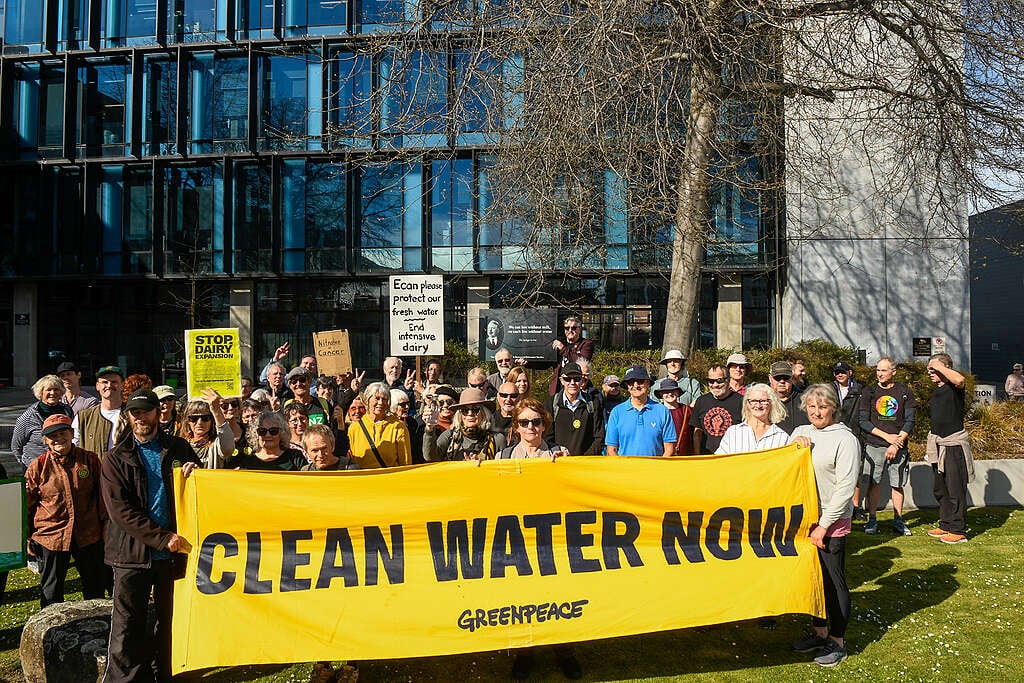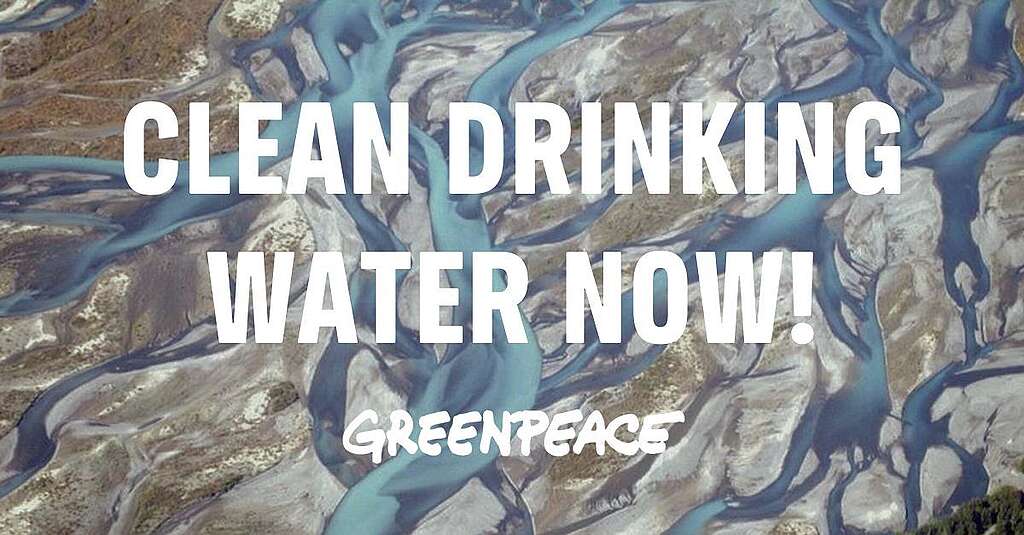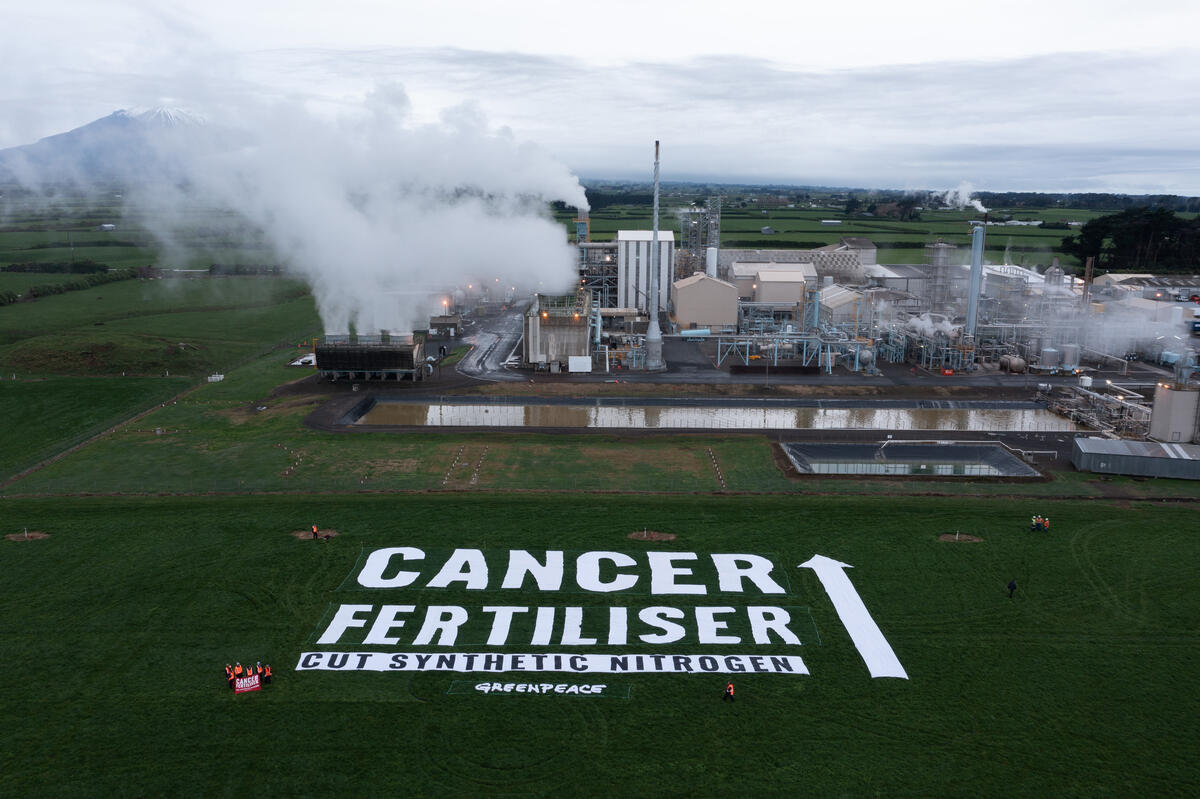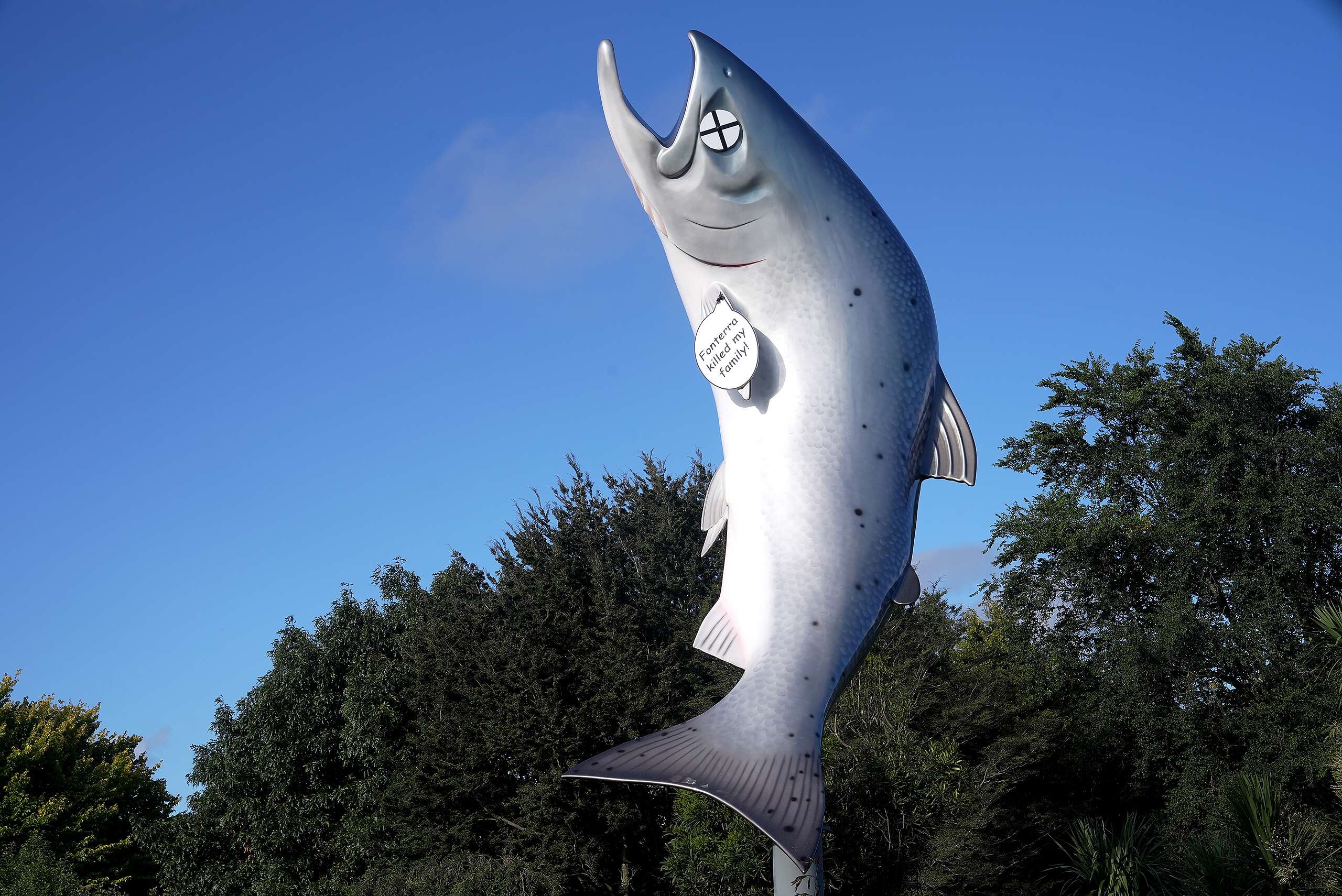In a first for New Zealand, Canterbury’s regional council (known as Environment Canterbury) has declared a “Nitrate Emergency”.
Outgoing Councillor Vicky Southworth brought the motion to the Council, and after some fierce debate it passed – 9 votes in favour to 7 votes opposed. The declaration says that the Regional Council must urgently address the issue of groundwater pollution. That’s important, because groundwater pollution is impacting drinking water sources.
On this page
- What is a Nitrate Emergency?
- Why is Canterbury experiencing a Nitrate Emergency?
- How bad is nitrate contamination in drinking water?
- Who pays to fix the Nitrate Emergency?
- What has Environment Canterbury done by declaring a Nitrate Emergency?
- What will happen next?
- Take action to stop the Nitrate Emergency
To say this declaration has been a long time coming would be an understatement. Community frustration was clear outside the Environment Canterbury (ECan) offices, where Greenpeace held a rally to coincide with the last council meeting before local elections.

Outside, locals spoke of undrinkable water and their fears of health risks associated with high nitrate levels. Inside the council chambers afterwards, Councillors debated whether to acknowledge the crisis.
It’s pure coincidence that Councilor Southworth’s notice of motion to declare a Nitrate Emergency coincided with Greenpeace’s “Clean Water Now” rally. But it’s hardly surprising considering the growing number of frustrated Cantabrians having to deal with nitrate-contaminated drinking water.
Regional councils, like Environment Canterbury are responsible for protecting sources of drinking water. But decades of inaction has led to a growing drinking water crisis in Canterbury. And now it’s a political lightning rod.
What is a Nitrate Emergency?
In the simplest terms, a Nitrate Emergency declaration is a recognition that drinking water in Canterbury is in crisis due to nitrate contamination, and that urgent action is needed.
What that means is that intensive dairying in Canterbury has gone too far. It means that up until now, Environment Canterbury has not done enough to ensure that all of their constituents have access to safe healthy drinking water.
And it provides us with an opportunity to push local election candidates to stand up for strong action on nitrate contamination.
Why is Canterbury experiencing a Nitrate Emergency?
Canterbury’s Nitrate Emergency has primarily been caused by the explosion of the dairy industry in the last 30 years – which has happened on ECan’s watch.
In 1990, there were 112,000 dairy cattle in Canterbury. By 2023 there were 1.25 million – a massive dairy boom which has blown past the region’s ecological limits. Since 2002, the use of synthetic nitrogen fertiliser in Canterbury increased 300% to squeeze ever more dairy cows onto the land.
Because of this dairy boom, New Zealand’s drinking water, particularly in Canterbury, is becoming increasingly contaminated with nitrate. Despite that, just this year Environment Canterbury has approved an additional 16,000 new dairy cattle to be added to farms across the region.
Nitrate contamination is mainly caused by synthetic nitrogen fertiliser and dairy cow urine. Because the soils in Canterbury are rocky and porous, there is little barrier to stop dairy pollution from seeping into the ground. From there, it contaminates underground water supplies.
How bad is nitrate contamination in drinking water?
Our Know Your Nitrate map shows the extent of nitrate contamination across Aotearoa. Since 2021, we’ve tested nearly 3,000 samples of drinking water as part of our nitrate testing programme – with alarming results.
We have tested drinking water from Canterbury with nitrate levels as high as 29 mg/L – more than double the legal limit. Households in rural areas that source their water from private wells are most at risk. But now, some town supplies are reaching concerningly high levels of nitrate. This includes the Oxford and Darfield town supplies that have returned results of around 5 mg/L.
There is a growing body of evidence linking nitrate contamination with several risks to human health. Nitrate levels in drinking water above 5mg/L are associated with an increased risk of preterm birth. And levels of nitrate above 0.87mg/L have been associated with increased risk of colorectal cancer.
Who pays to fix the Nitrate Emergency?
Right now, the cost of contaminated water is borne by the community. Selwyn District Council has earmarked millions of dollars to establish a new source of drinking water. They’re doing this in response to rising levels of nitrate in the Kirwee, Darfield and Rolleston town supplies – and their ratepayers will be picking up the tab.
For households that source their water from a private well, the costs won’t be covered by councils. Instead, they’ll have to pay out of pocket for filtration systems to remove the nitrate. The costs vary, but often in the thousands.
District Councils and private well owners have all of the responsibility and cost to supply safe drinking water. But they have no control over the land use that pollutes the ground water – that’s ECan’s responsibility.
Meanwhile, the corporate dairy industry is creaming it. In May, Fonterra reported increased profits and earnings per share. Fonterra’s CEO, Miles Hurrell, earned $5.9 million last year, making him the third highest-paid CEO in the country.
Communities with drinking water contaminated by dairy pollution won’t see a dime, while the rest of New Zealand is paying through the nose for a block of butter.
It’s a classic example of privatising profits while socialising costs. However, ECan’s Nitrate Emergency could challenge this imbalance.
What has Environment Canterbury done by declaring a Nitrate Emergency?
The motion passed by ECan has three key points, and it’s worth breaking them down. That’s because the motion places several obligations on the next Council’s agenda. Following the local elections, councillors sitting around the ECan table will have to up their game.
Part 1: That Council Declares a ‘Nitrate Emergency’ and recognizes that ECan should take a leadership role to urgently address the issue of groundwater pollution impacting drinking water sources and supplies.
While symbolic, it’s a notable recognition of the problem and ECan’s responsibility to manage it. This is the first time a regional council has declared a Nitrate Emergency in New Zealand – so it’s a huge deal.
Part 2: Requests that ECan staff bring a workshop to the next term of Council to outline the scale, causes, spatial distribution, latest lag time research, and current and predicted impacts of nitrate pollution in Canterbury.
The regional planning process can take a long time, but nitrate pollution requires immediate action. This workshop will ensure that the new council has up-to-date information on the Nitrate Emergency. Doing so helps to keep the issue of nitrate contamination on the ECan agenda.
During the debate, several councillors said that they should consider “non-statutory” interventions on nitrate contamination. This could enable more rapid progress on dealing with the pollution.
Part 3. Consider options so that nitrate polluters contribute to the costs of nitrate removal. ECan staff will prepare advice for the council on the indicative cost to drinking water supplies and private well owners on treating nitrate contaminated groundwater, or finding alternative sources of water low in nitrate. In addition, they will consider options to reallocate costs via a target rate, levy or other mechanism.
Right now, district councils and individual well owners have to pay to clean up pollution that they have not caused. A polluter pays model – which is what Part 3 is referring to – could see that change. Under this model, nitrate polluters like the intensive dairy industry would have to help cover the costs of removing nitrate pollution from drinking water.
What will happen next?
We will continue to fight for everyone’s right to clean drinking water. By November, Environment Canterbury will have their first council meeting following the election of a new crop of councillors. The 16 councillors sitting around that table will be responsible for taking action on the Nitrate Emergency.
What does this mean for ECan and Canterbury’s district councils though?
In the short term, not a lot. This isn’t like a State of Emergency – which is a legal declaration that unlocks emergency powers and resources for authorities to respond to natural disasters like floods and earthquakes.
But declaring a Nitrate Emergency is an applaudable first step towards safe drinking water for all. Not only that, but for the first time, ECan is recognising the costs of nitrate contamination.
For the Selwyn District, a polluter pays model could be music to their ears. Their Council has estimated that establishing a new source of drinking water to supply their towns could cost $400 million. Without intervention, a low-nitrate source of water will have to be paid for by the community in their rates.
Ultimately, actions speak louder than words. It’s one thing to support a declaration but another thing entirely to meet it. And that will depend on who is sitting around the council table at ECan after the election.
We will continue to hold them to account and demand they take urgent action to fix the Nitrate Emergency. And we need your help to make sure that they are committed to defending fresh water.
Any serious candidate running in the Environment Canterbury election must be committed to defending Canterbury’s freshwater. That means ending dairy expansion and phasing out the use of synthetic nitrogen fertiliser. The question is, who will step up to the task?
Take action to stop the Nitrate Emergency
If you’re in Canterbury, check out our Environment Canterbury candidate scorecard ahead of the local elections, and make sure you vote for clean drinking water.
Then, sign our petition to Environment Canterbury, calling on them to commit to protecting drinking water.

Join us in calling on Environment Canterbury to commit to enduring freshwater protections that ensure safe drinking water and swimmable rivers for all.
Take Action

